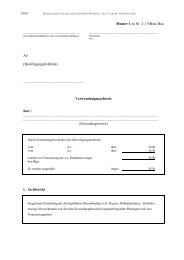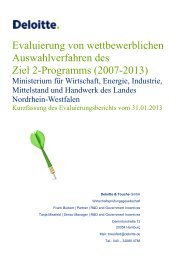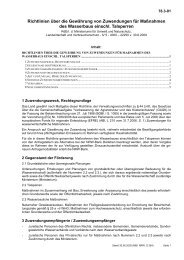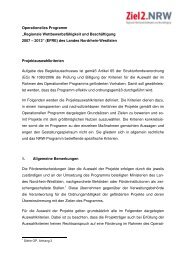Synthesis Report - European Commission - Europa
Synthesis Report - European Commission - Europa
Synthesis Report - European Commission - Europa
You also want an ePaper? Increase the reach of your titles
YUMPU automatically turns print PDFs into web optimized ePapers that Google loves.
<strong>Synthesis</strong> <strong>Report</strong> Ex-post Evaluation of the ERDF 2000-2006<br />
Portugal, where it remained unchanged. It was also the case in Italy and the Netherlands, where<br />
GDP increased barely at all.<br />
On the other hand, in 6 of the EU15 countries, growth hardly slowed down at all over these two<br />
years and in four countries, it averaged around 3% a year or more. These four included Greece<br />
and Spain, two of the Cohesion countries.<br />
In the subsequent three years, 2003-2006, GDP growth recovered everywhere. The recovery,<br />
however, was less in three countries in which cohesion policy was particularly important,<br />
Germany, Italy and Portugal, than elsewhere. This was especially the case in Portugal, where<br />
growth of GDP averaged only just over 1% a year over the period 2003-2006, considerably less<br />
than over the years before 2001. In Germany and Italy, growth was only slightly higher and less<br />
than experienced in the 1990s during the previous programming period.<br />
In the other EU15 Member States, growth was close to the long-term trend. The main exceptions<br />
were the Netherlands and Ireland, where it was slightly lower than in the earlier programming<br />
period but still relatively high. By contrast, in both Greece and Sweden growth was higher than in<br />
the earlier period, at around 4% a year.<br />
While growth in 2007 was for the most part much the same or higher than over the preceding<br />
three years, there was a marked slowdown in 2008 in most countries as the financial crisis began<br />
to take effect. The economic climate for the conduct of regional development policy, therefore,<br />
became unfavourable. By then, however, the funding made available for the 2000-2006<br />
programming period had already been committed, so it is likely to have had a minimal effect on<br />
policy.<br />
In Italy and Portugal, together to a lesser extent in Germany, the national economic context was<br />
unfavourable throughout much of the period. On the other hand, in Greece and Spain, the other<br />
major recipients of Structural Fund support, the reverse was the case and regional development<br />
policy was implemented in the context of relatively high and sustained rates of economic growth.<br />
2.2.2 Growth of GDP in the EU10 Member States<br />
In the EU10 countries, with the exception of Malta, growth was universally higher than in most<br />
EU15 countries throughout most of the period, during both the pre-accession years and the years<br />
after entry.<br />
In most EU10 countries, entry into the EU was accompanied by an increase in the rate of growth.<br />
In all except Malta (where growth was still higher than before), growth of GDP averaged over 4% a<br />
year in the three years 2004-2006 and in all apart from Cyprus, Hungary and Slovenia (where it<br />
was only marginally below), 5% a year or more. The growth rate was particularly high in Slovakia<br />
and the three Baltic States.<br />
In 2007, growth slowed down only in Hungary, where macroeconomic problems predate the<br />
financial crisis. Growth was also reasonably high in most countries in 2008. In Estonia and Latvia,<br />
however, the reversal of fortunes was dramatic. In both, GDP fell sharply after rising markedly for<br />
many years before then. In Hungary, growth continued to slow down, while in Lithuania, growth<br />
was considerably less than in preceding years.<br />
Only in these four countries, therefore – though in Lithuania only to a minor extent – and then<br />
only at the very end of period, is regional development likely to have been adversely affected by<br />
unfavourable economic conditions at the national level.<br />
48

















